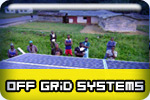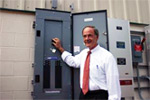Solar firm courts Kenya sales
A Delaware solar assembly and installation company is looking to Kenya as a possible expansion market, hedging against a patchwork of short-term solar incentives in this country. he Kenyan ambassador to Washington was at Wise Power Systems near the Port of Wilmington on Monday, touring the facility and discussing a potential partnership.
Wise Power is considering exporting its “Sun-in-One” easy solar installation kits to Kenya, and would need that country’s cooperation to become part of its rural electrification project. Wise Power is giving some longer-term consideration to assembling the kits in Kenya, officials there say.
The parts for Wise Power’s current solar arrays are made in China and the United States, assembled in Delaware and transported to installation sites in this region.
William Rawheiser, Wise’s president, said Kenya represents a way to diversify his business in the face of unpredictable solar incentives from the U.S. government. Some states have stronger financial incentives than others, and a key federal price support for the industry is set to expire at year’s end.
Rawheiser said it’s rewarding to help bring electricity to impoverished rural areas, as it did with solar installations in rural, impoverished African nation of Equatorial Guinea, which were sponsored by that government.
“I’ve never had American customers stand up and cheer when we turned the system on,” Rawheiser said. “You’re making a difference in people’s lives, and making money at the same time.” The company has 16 full-time permanent employees, and was founded in Delaware seven years ago.
The Kenyan ambassador, Elkanah Odembo, said only about 20 percent of the Kenyan population has access to electricity, and in rural areas, only 2 percent to 3 percent have electricity.
The Kenyan government has set a goal of having the entire nation electrified by renewable energy by 2030.
“For us, it’s a tremendous opportunity,” Odembo said.
Sen. Chris Coons, D-Del., met the ambassador during Monday’s event. Coons, who spent time in Kenya while he was in college, noted that the region is an ideal candidate for renewable energy. Kenya has “lots of sunshine, lots of wind,” and no oil or natural-gas reserves, Coons said. “I saw what a dramatically different country it is when the power comes on, the power comes off,” Coons said. It made it difficult for anyone in that country to make plans, he said.
Kenya and other African nations are ideal targets for solar energy, in which small, locally sited power systems don’t have to rely on a distribution grid, said Brian Yerger, president of the Wilmington alternative-energy consulting firm AERCA Advisors.
“There’s literally a hundred reasons why you could do something like that,” Yerger said. But “the largest problem is who’s going to pay for it.”
Several nongovernmental organizations are helping fund the Kenyan government’s rural electrification efforts.
Michael Haney, Wise Power’s director of global operations, said his company stands to make a profit by selling the carbon offsets generated by the solar panels. The offsets can be sold in the United Kingdom, he said.
Wise Power officials will visit Africa as part of a U.S. Chamber of Commerce trade delegation starting Feb. 19. Company officials will meet separately with Kenyan government officials during the trip, and visit neighboring countries to talk about selling solar there, too, Haney said.













